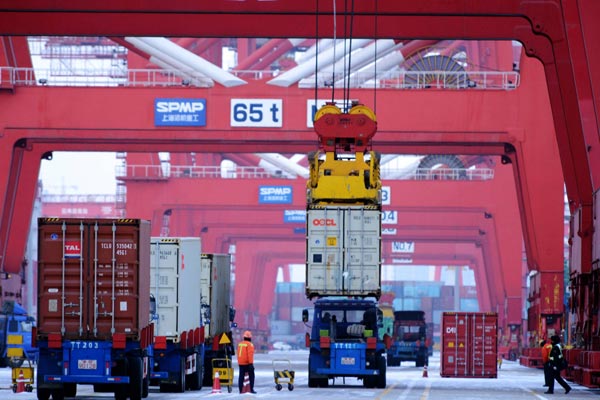China's power as a global investor also benefits US
 |
|
A ship loads containers at a terminal in Qingdao, Shandong province. China is poised to open up its market further to foreign investment. [Photo/China Daily] |
Some petty-minded people ruin their own opportunities by viewing their potential partners as being as mercantilistic as themselves. This is the way in which some trade war warriors in the United States see their country's trade relations with China.
They see China, by selling more to the US, as being cunning or pursuing the strategic goal of eventually undoing the US. They say the US, which sells less merchandise to China, is being robbed of its jobs, and claim its economy is being raped.
They refuse to see that every year China is buying a lot more services from the US, Chinese parents pay huge amounts to educate their children in US colleges, and that in more recent years, Chinese companies have begun investing more and more in US companies.
In 2016, according to law firm Baker & McKenzie and research company Rhodium, China's direct investment into the US and Europe more than doubled, to a record $94.2 billion, even after almost $75 billion worth of deals were canceled for reasons that included US government objections.
They also point out that in 2015, when China's total outbound investments hit a record high of $145 billion and the country overtook Japan to be the world's second-biggest cross-border investor after the US, China's investment was $15 billion in the US and $23 billion in Europe.
A mere decade ago, when China was the world champion for receiving foreign direct investment, Chinese companies' outbound investments were only minimal.
Facts speak louder than words and money speaks for itself. No one can reasonably think, as the US trade war fanatics claim, that by committing its hard-earned dollar bills back to the US as capital investment, what China wants is only the latter's demise.
In fact, the broader picture of China's outbound direct (non-financial) investment is that, according to Chinese sources, Chinese investors made a total commitment of $170 billion to some 8,000 companies in 160 countries and regions in 2016, showing a year-on-year growth of more than 40 percent.
Rational people can't call any of the above small numbers, or think they are of only a small use in creating new jobs. Should the US trade war warriors want to remain blind and continue to discriminate against China, they may ruin their own country's business opportunities, in trade, in services, as well as in investment. Doing so won't help them deliver on their promise to create US jobs.
















